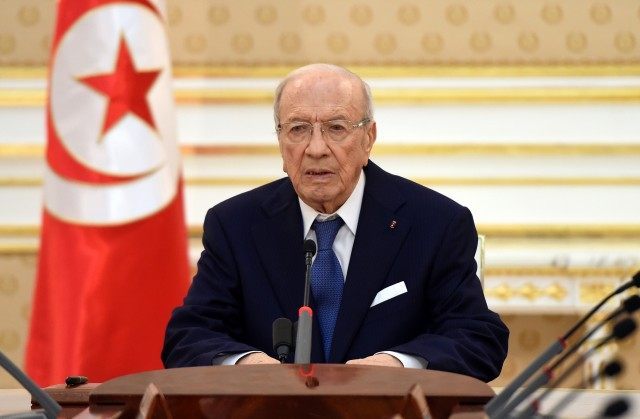In a televised address given Saturday, President Beji Caid Essebsi announced that Tunisia has declared a state of emergency, just over a week after 38 tourists, 30 of them British, were killed in an Islamist attack in the resort city of Sousse. Essebsi presented this as “exceptional measures” saying the terrorist attack left Tunisia “in a state of war.”
In doing so the President was exercising his constitutional power “in the event of imminent danger threatening the nation’s institutions, or the security or independence of the country” to “take any measures necessitated by the exceptional circumstances.”
The state of emergency, which runs for a renewable 30 day duration, gives more powers to security forces and limits the right of public assembly, press freedom and the right to strike. This follows measures already taken to tighten security, such as the deployment of over 1,400 armed officers to patrol hotels and beaches, which have so far failed to prevent tourists headed home in droves. Essebsi said:
“I believe and I say it clearly, that if the events that happened in Sousse happen again, the country will collapse and it is my duty as president, to prevent this… God willing.”
The BBC reports analysts say Tunisia has been put at risk by the chaotic situation in neighbouring Libya and by Tunisians returning from fighting in Syria and Iraq. Essebsi referred to the Libyan threat in general terms and spoke at length about the economic and social challenges facing the country, including high unemployment and poverty in the country’s interior.
He said Tunisia was targeted because of its progress in creating a functioning democracy with a new democratic constitution and its “transparent and fair” parliamentary and presidential elections last year. In the speech he offered reassurances that his government “respects the freedom of expression, the freedom of the press. These are among the gains of the revolution. But those exercising these freedoms must also take into account the situation.”
Despite this being the second terrorist attack in Tunisia this year (two gunmen killed 22 people at the Bardo museum in the capital, Tunis, in March), Essebsi said security forces had only responded to security challenges “gradually” because there had not been “the culture of terrorism in Tunisia.”
The Tunisian Prime Minister’s office said several officials had been sacked in the wake of the attack, including the governor of Sousse.
Tunisia last declared a state of emergency in 2011 during the uprising which overthrew President Zine al-Abidine Ben Ali. It was only lifted in March last year. In the coming weeks officials are finally expected to pass a counter-terrorism bill that has been with parliament since early 2014.

COMMENTS
Please let us know if you're having issues with commenting.